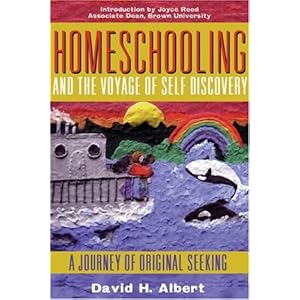I'm going to add here a few quotations from Homeschooling and the Voyage of Self-Discovery which I found particularly insightful, so that I can refer back to them later when the books themselves are back at the library. His ideas don't translate immediately into a to-do-list or a lesson-plan, but I found them helpful as I continue trying to define exactly what my aspirations are for the girls' education. I love a lot of the ideas behind child-led learning - I think we'll lean more towards unschooling than to school-at-home - but the more child-led things get, the more difficult I think it would be to make any kind of assessment about whether the child's education is progressing towards something. I'm sure at any given moment, I could come up with reasons for why the child's current activities are valuable, but would there be a discernible overall direction or progression...? I think the quotations below will help me view a frameless kind of educational plan through some kind of a framework.
p.49: "Whenever we are stuck in our homeschooling routines, whether it be around math or anything else, I am learning not to be frustrated with my children, but to step back and ask myself three questions: Have I provided what is necessary so that my kids can discover the beauty in what they are learning? Have I given them opportunities in the present to use it? Do they have models in front of them to which they can aspire if they put in the necessary learning effort?"
p.84-86: "Learning requires structure ... in the mind, ... the mental architecture that allows us to engage and make sense of the world around us. ... This structure takes the form of what might be thought of as 'conversations.' ... As children develop, different conversations come to center stage, engaging them most fully in putting together, for themselves, a structure that makes sense. These five conversations are:
- the conversation with nature and the natural order;
- the conversation with the past and with history;
- the conversation with the present and the world of convention and, especially, social convention;
- the conversation with the future;
- the conversation with Oneself.
I am convinced that these conversations, taken together, represent the individual and unique, yet fundamentally human, need to search for truth, not as a machine-like apparatus registering facts, but in the mastery of material and spiritual life."
p.98, explaining what he means by the 'conversation with Oneself': "I call this the conversation with Oneself, to stress the intimation that one may have that the self is larger than one's own individual ego. If you are of a religious frame of mind, you may think of it as a conversation with God or the Divine, or, as I like to think of it, with the Inward Teacher."

No comments:
Post a Comment